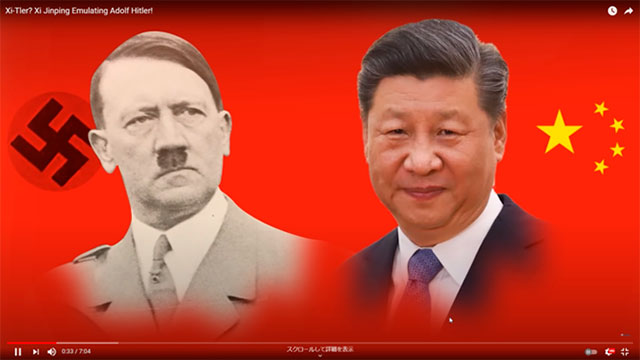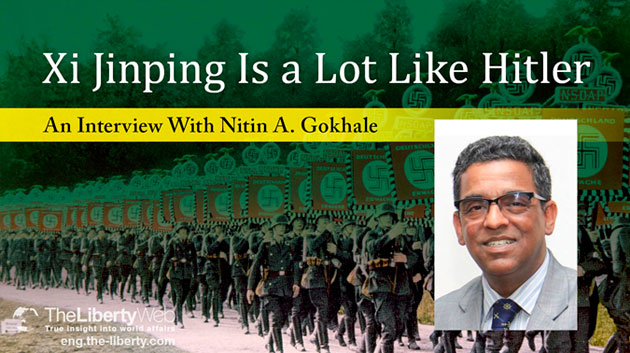Xi Jinping Is a Lot Like Hitler
Everett Collection / Shutterstock.com
founder of Indian defence websites
Nitin A. Gokhale
(profile)
One of South Asia’s leading Strategic Analysts, a founder of a specialised defence related website BharatShakti.in. and Strategic News International. He teaches and lectures at the National Defence College, the Army, Air Force and Naval War Colleges etc.

Image Source: https://youtu.be/-zPPD8lQSEk
Dr. Gokhale published a video online contrasting Adolf Hitler and Mr. Xi Jinping, and was threatened by the Chinese embassy with terrible consequences if he did not remove it. We asked him about the similarities between the two men.
The first similarity between Hitler and Xi Jinping is their insistence on “restoring the glory of their country.” Germany was a defeated power in World War I, was heavily indemnified, and held a grudge against the other countries. There, Hitler made a speech saying that Germany was a great nation and must not bow down to other powers, which attracted attention and brought him to power. If you look at Xi Jinping’s rise, he fanned, “China has been invaded and humiliated by Japan and other countries. We will restore the glory of the past.”
The second similarity is the taking advantage of the great depression. Hitler took advantage of the huge unemployment in the Great Depression of 1929 to call for economic development by industrializing German. In 2008-09, Xi Jinping, who was Vice President at the time, also took advantage of the global financial crisis (Lehman Shock) to start taking control.
The third similarity is the thorough elimination of political challengers: in 1934-36, Hitler eliminated all his political challengers when he rose to power. If you look at the period in 2013-19, Xi Jinping also arrested and sidelined his political rivals one after another.
The fourth similarity is complete control of state organizations. In 1934-36, Hitler took full control of all state organizations, including the party, the army, and the police, and formed the SS, the Nazi special forces. In 2014-19, Xi Jinping also took control of all organs of state and became the supreme commander of the People’s Liberation Army and the party started to hold loyalty to him. In 2018, the limit on the term of the president was removed, paving the way for a life term.
The fifth similarity is thought control. Hitler used “Heil Hitler” as his slogan, and Xi Jinping started imposing his thoughts on the Party and schools etc. Xi Jinping became the core of the Communist Party and demanded that people swear loyalty to him and the Party.
The Mistake of Leaving China Out of Appeasement
Xi Jinping aims to make China the number one in the world by 2049, and the world is letting China get away. I think this is a mistake. Currently, China is not giving enough information about the origin of the coronavirus. It has also being very aggressive on its maritime and land borders with India, Japan, Vietnam and the Philippines and so on.
China’s opaque system and dictatorship are particularly big problems. Governing people and not giving them freedom of expression and press as in China is not something the world should allow to happen. The U.S., the world’s superpower, keeps doing freedom of navigation patrols and talking in response to China’s invasion of the South China Sea, but has taken no action against China and is completely half-hearted. The situation is something similar to what happened in the pre-World War II where appeasement led to conflict. Non-action might lead to a situation where China becomes more and more hegemonistic.
Japan Should Learn From India, Which Pushed China Back Militarily
For the past few years, India and China have been at loggerheads on the land border, with Sino-Indian troops standoffs at Chumur in 2014 and at Doklam in 2017, with Chinese troops were eventually forced to withdraw. The conflict in Ladakh is not fully resolved as yet, but Chinese troops had to back out from the deployment it have done in areas of India’s interest. So India is the only country which has actually stood firm, both militarily and otherwise.
For example, Japan, the U.S., Australia, and India (the Quad) should switch to a cooperative relationship that includes military force, as there is no hard military component to the Quad yet and are not a very forceful coalition. We appreciate Japan, but we have doubts that Japan will stand by our side if China was to aggressively come. Japan should be more assertive against China.



















